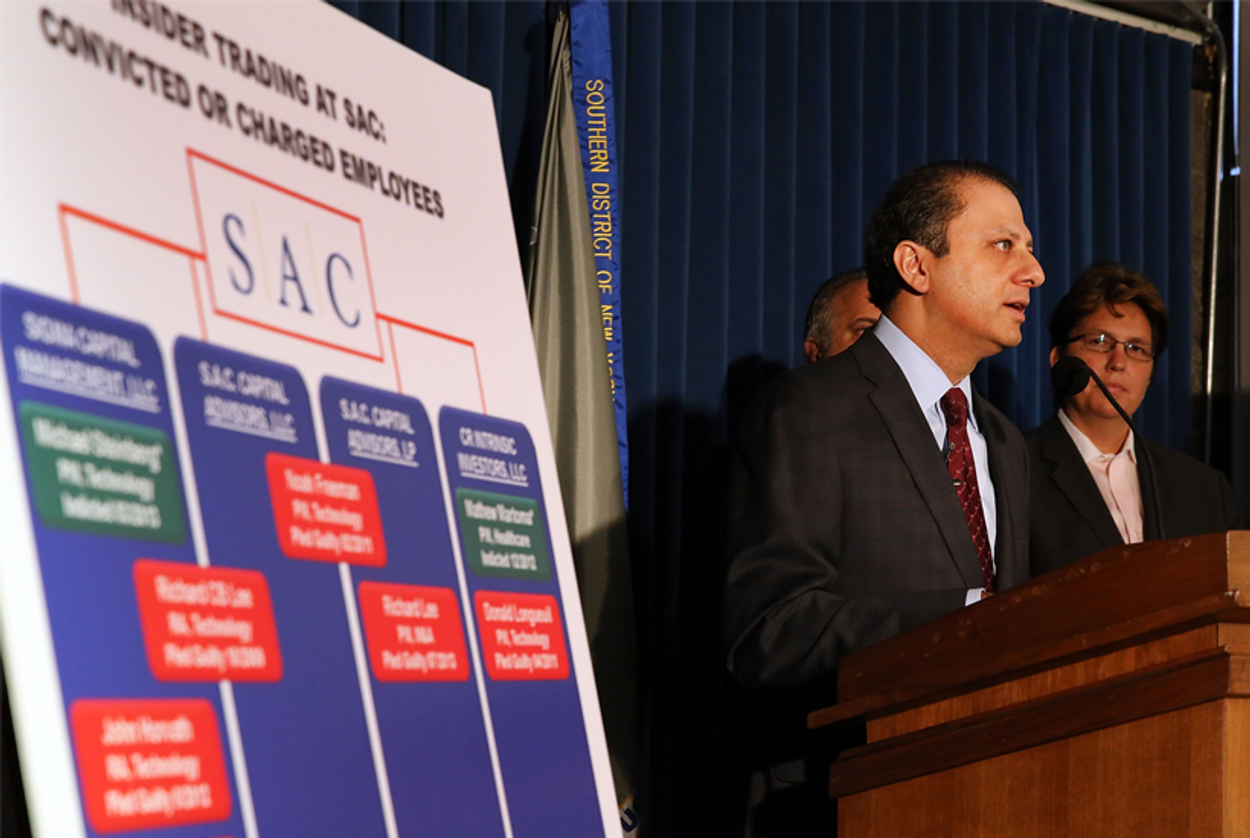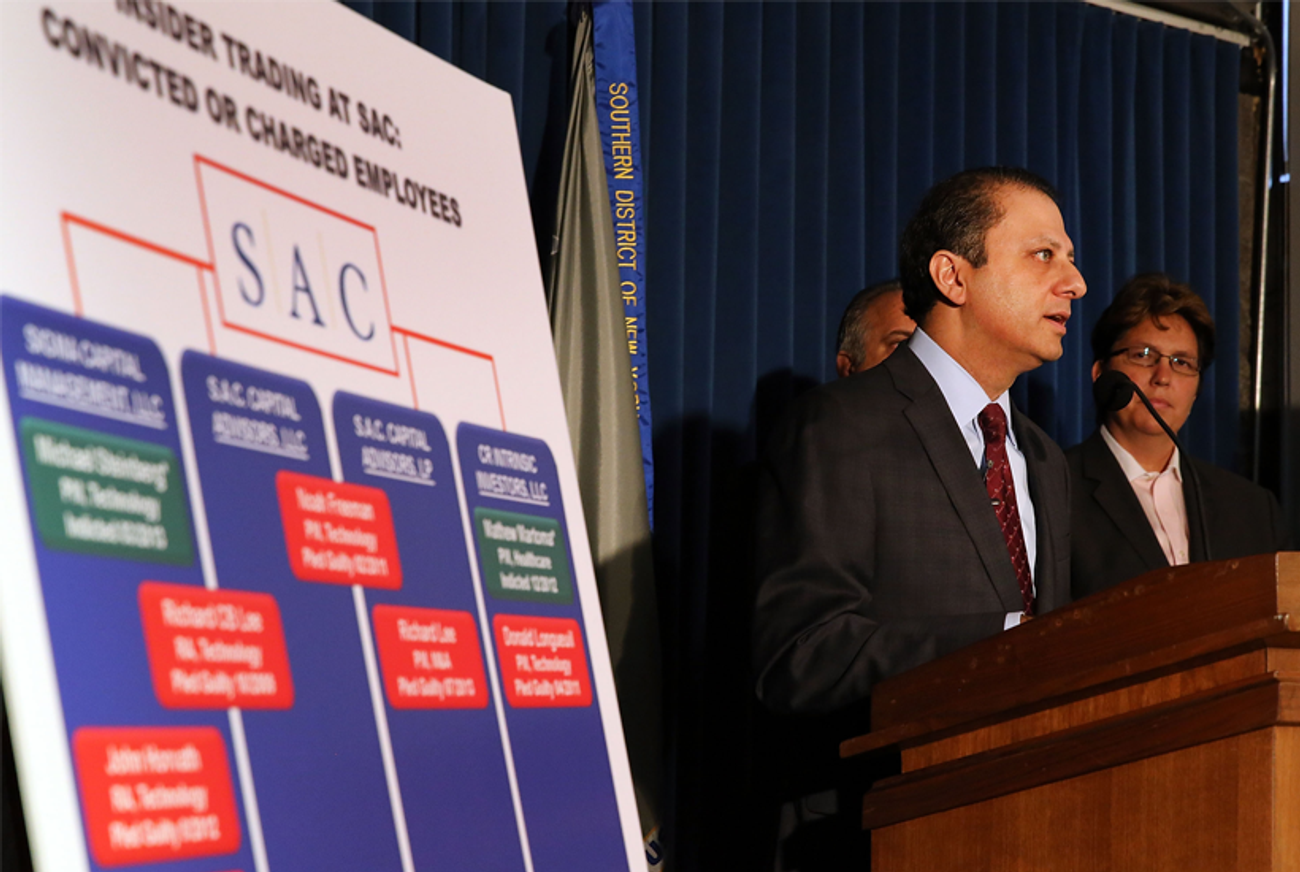Note to the Feds: Leave Hedge-Fund Mogul Steven Cohen Alone!
The indictment of SAC Capital may be Talmudically interesting, but as government policy it’s a disaster




What were you up to this weekend? Might you have thrown a party in your 10-bedroom beach-side mansion for a few close friends? And as you were nibbling on $2,000 worth of freshly caught tuna hauled in from a nearby fishmonger, were you discussing your recent splurges, which include a Pollock and a Picasso and a chunk of the New York Mets? If you were, chances are that most of the rest of the world has very little sympathy for you and is only too gleefully ready to assume that your ludicrous wealth was somehow ill-gotten. But if the ones feeling the schadenfreude represent the government—well, then, Hamptons, we have a problem.
The predicament above, in case you’ve skipped over the financial pages this past week, is the one currently visited on Steven A. Cohen, the billionaire who had lent his initials and his acumen to SAC Capital Advisors, for years one of Wall Street’s most luminous hedge funds. To hear the feds tell it, much of the firm’s lucre—“hundreds of millions of dollars of illegal profits,” according to a recently filed indictment—materialized as a direct result of a systemic penchant for insider trading. Speaking at a press conference last Thursday, U.S. Attorney Preet Bharara argued that SAC was no less than a “magnet for market cheaters,” which, given the billions of dollars at stake, must have meant that Cohen himself was the evil genius charging said magnetic field.
And yet, no personal charges were made against the boss; in an unusual step, it was the firm itself that was indicted, based largely on the “guilty” pleas of six former employees facing intense pressure from the government. Which is kind of like indicting the Corleone family of murder, racketeering, and a host of other nasty behaviors but letting Vito go unmolested.
The comparison with American fiction’s great saga isn’t too outlandish. The SAC case is so fascinating to us unwashed masses in part because more than being a mere workaday case of financial wrongdoing, it evokes a literary—one almost wants to say Talmudic—discussion about the meaning of language, the nature of information, and the essence of interpretation. Or, in other words, it’s a profoundly Jewish affair.
To understand what’s at stake, it helps to first know the law. Insider trading, according to the Securities and Exchange Commission, “includes both legal and illegal conduct,” generally referring to “buying or selling a security, in breach of a fiduciary duty or other relationship of trust and confidence, while in possession of material, nonpublic information about the security. Insider trading violations may also include ‘tipping’ such information, securities trading by the person ‘tipped,’ and securities trading by those who misappropriate such information.”
Confused? You should be. Because the devil, like all good attorneys, is in the details, consider one of the indictment’s central tenets, which, for purposes of clarity and drama, we’ll call the Case of the Chatty California Caregiver. Simply put, the government alleges that SAC ridded itself of stock after obtaining insider information from a California doctor close to clinical trials conducted by the pharmaceutical company Elan. That Elan’s own predictions were negative, or that analysts overall agreed that the stock was one to dump, seemed to matter little to Bharara, the attorney general who reached the pinnacle of his fame with a Time magazine cover announcing that he was the man who was busting Wall Street. The stock dropping, the prosecutor argued, followed advice the California doctor illicitly whispered in the ears of SAC employees.
But a lengthy and eminently convincing white paper, prepared by SAC’s legal counsel, puts even this flimsy version to rest. Presenting a minutely detailed account of the firm’s internal communications, it shows that all on board were convinced that the California physician was not privy to any nonpublic information and knew well that the good doctor had not signed any confidentiality agreement forbidding him from divulging what he had learned from conversations with colleagues at Elan. Add to that the fact that the talkative physician volunteered information of his own accord—the SAC analyst who had called him had no intention of discussing Elan’s clinical trials—and it’s easy to believe Cohen et al. when they argue that they believed their precious source “was simply reporting what was both obvious and public.”
And so, barring any hard evidence of concrete and carefully defined wrongdoing, we ought to be deeply suspicious of any concerted federal effort to exert so much pressure based on so little fact. But if the government’s conduct in the SAC case is regrettable, it is also fascinating. The more you dive into the case, the more you feel as if Cohen and the federal government are enacting some loopy take on the central intellectual struggle that had informed Jewish life for millennia, with Cohen taking the rather goyishe stand that laws are laws and anything not clearly defined is therefore clearly not punishable, while the government approaches the case as Jews have traditionally approached the Talmud, interested not only in the letter but in the spirit, relishing every possible permutation, savoring every sliver of meaning. The doctor we talked to signed no confidentiality agreement, say the gentlemen at SAC, and he saw no secret data; therefore, talking to him was kosher. Maybe strictly speaking, says the government, but confidentiality agreement or not, with access to secret data or without it, talking to a doctor close to the trials gave SAC an unfair advantage. It’s the kind of logic one encounters in the Haggadah—the bit about the rabbis debating just how many plagues God launched against Egypt comes to mind—not in court. And it would be downright beautiful if it weren’t unduly targeting a major financial firm for fame and political fortune. It’s good to know that Cohen remains unfazed when faced with these allegations and that he has his tuna to comfort him. Dayenu.
***
Like this article? Sign up for our Daily Digest to get Tablet Magazine’s new content in your inbox each morning.
Liel Leibovitz is a senior writer for Tablet Magazine and a host of the Unorthodox podcast.
Liel Leibovitz is editor-at-large for Tablet Magazine and a host of its weekly culture podcast Unorthodox and daily Talmud podcast Take One. He is the editor of Zionism: The Tablet Guide.